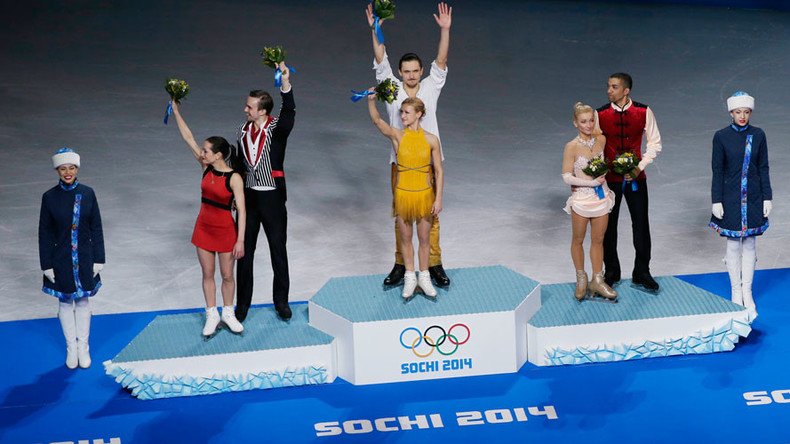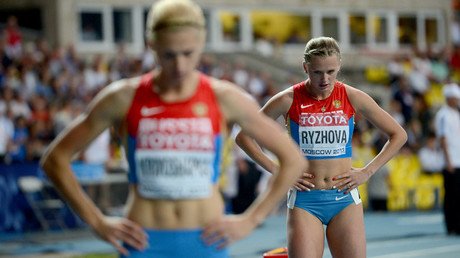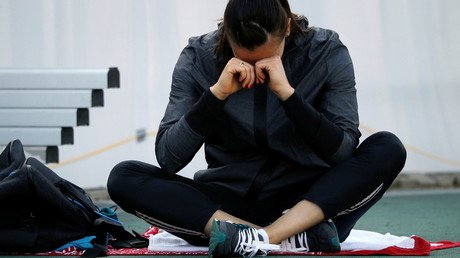On the Sochi doping scandal, after all

I wonder, whom do they expect to fool? An incompetent public? Or a handful of fringe Russian liberal journalists, who tend to ignore common sense and let themselves be hoodwinked with the first whiff of an alleged crime by the 'brutal Putin regime'?
The headline reads “after all,” because I didn’t want to write about this scandal at first. It’s been a long time since I worked as a sports journalist, and I am not privy to any more information on this case than what is out there. But suddenly I realized that even someone with a very basic knowledge of the world of sports can make a few interesting observations based on the readily available information. Yet it appears that no one has done so, at least not publicly. And so, behold the doubts that I have about this report.
If you look at the most sensational part of the latest WADA report – the anti-doping laboratory in Sochi placed in a building with a “mouse hole” in its wall, the secret-formula drug cocktails with whiskey for men and vermouth for women, the specially-designed technology for swapping samples and other spectacular details worthy of a James Bond movie – its bottom line is that Russia was able to show exceptional performance at the Sochi Olympics thanks to a newly devised, super-efficient doping program conducted during the games.
I wonder whom do they expect to fool with this story? A totally incompetent public? Or just a handful of fringe journalists within the Russian liberal media, who tend to cast away common sense and let themselves be hoodwinked with the first whiff of an alleged crime of the “brutal Putin regime”?
Let me explain. Russia did indeed win 13 gold medals (it’s gold that really counts) and showed the highest team score at the Winter Olympics in Sochi. But almost all of those medals were won in disciplines where you can’t gain anything by using performance enhancement drugs at the last moment. As for the strength and speed sports, where last-minute doping actually can make a difference, alas, our athletes actually failed in these competitions, and badly.
See for yourself. Three of Russia’s gold medals (including one for a relay race) were garnered by Viktor Ahn in short track speed skating. Viktor Ahn had been the world’s number one short track speed skater and repeatedly passed doping tests in South Korea long before he became a Russian citizen. Who would even consider engaging such an athlete in an illegal doping scheme? This clears three gold medals.
One more gold medal comes from another newly naturalized Russian citizen, snowboarder Vic Wild. Does anyone in their right mind seriously believe the Russians would risk offering drug-spiked whiskey to a fresh-off-the-boat American? Besides, doping doesn’t get you anywhere in snowboarding. On the contrary, riding a slope is a complicated exercise that requires balance and precision and any last-minute interference by a performance-enhancing substance can have a negative impact. That’s one more medal off the suspect list.
The same goes for Alexander Tretiakov (skeleton) and for Russia’s two-man and four-man bobsleigh teams. Theoretically, one can take anabolic steroids in sledding sports to gain muscle mass, but no one would do it right before the competition, as that’s simply pointless. And the additional boost hypothetically provided by a performance-enhancing drug would be offset by dulled-down senses, which can affect steering. Three more medals off the list.
Same story with team figure skating and the medals won by Russia’s Tatiana Volosozhar and Maxim Trankov in pair skating, and Adelina Sotnikova in the singles. Figure skating is a sport that involves extremely complicated movements requiring constant sharpness of senses. Which prohibited substances could figure skaters possibly take right before their event? Some kind of tranquilizers, perhaps? And even that would be very risky. But doping? Not likely. Another three medals cleared.
The hockey team could have benefited from doping, no doubt about that. But the thing is, we failed to win hockey in Sochi, and we failed miserably at that! There was probably no gold medal we wanted to take more than the hockey one, and it would make sense to think that we would be willing to use all sorts of “creative” means to get it.
So what’s left of the windfall of gold medals allegedly won by Russia in Sochi through an incredibly sophisticated doping scheme? ONE cross-country gold medal won by Legkov (out of 12 up for grabs in this sport) and ONE gold medal in biathlon relay men (out of 11). Is that supposed to be considered phenomenal success? To think that you’ve got to be a simpleton and an ignoramus. Even at the Vancouver Olympics, Russia’s worst in history, Russian athletes won TWO gold medals in biathlon and one gold medal in the men’s cross-country skiing sprint. Back then this kind of performance by our skiers and biathletes was deemed unsatisfactory.
At the Sochi Olympics, Russian athletes competing in events requiring stamina and a combination of speed and power showed results ranging from average (speed skaters) to disappointing (biathletes). So Russia won almost all of its gold medals in sports where doping was useless, while failing to win in those where doping could have helped.
Looks like this alleged, extremely expensive, complex, James Bond-style operation to pump the Russian team full of performance-enhancing drugs is one of the most inefficient projects in human history.
However this – the exact results achieved through illegal means – is the part that McLaren’s report says NOTHING about. Why is that? It seems the most logical thing would be for the report to say that such-and-such biathlete doped and became a champion, or this and that skier was taking the drugs and won a gold medal. This would surely make a strong point.
#RussianDoping is not just about the athletes or the Olympics. It's about ostracising Russia for political purposes spurred on by the USA
— Celestine (@CelestineBee) July 18, 2016
That’s why I have my doubts about the McLaren’s report. I can’t judge whether what Grigory Rodchenkov and “anonymous witnesses” said was true, and to what extent. Assuming they told the truth, it raises the question as to why the report, which contains so many scary stories about secret FSB agents disguised as plumbers and other dreadful things, studiously leaves out the utter ineffectiveness of this project (assuming it even existed)?
Could it be because then the McLaren report would turn into one big nothing? The commission would have uncovered something that wasn’t working anyway, and the call to disqualify the entire Russian team that supposedly has an unfair advantage would seem absurd – why disqualify the people who fail, no matter what methods they use? Could it be that the commission’s purpose was different from the outset and thus at odds with this logical conclusion?
These are my thoughts – based, I repeat, on publicly available information only. That’s what comes to mind if you know a thing or two about the subject and care to take a closer look at the story, rather than instantly jump on the bandwagon exalting the “report that exposes the criminal regime.”
Alexey Nikolov, First deputy editor in chief, RT and veteran sports journalist.
The statements, views and opinions expressed in this column are solely those of the author and do not necessarily represent those of RT.














